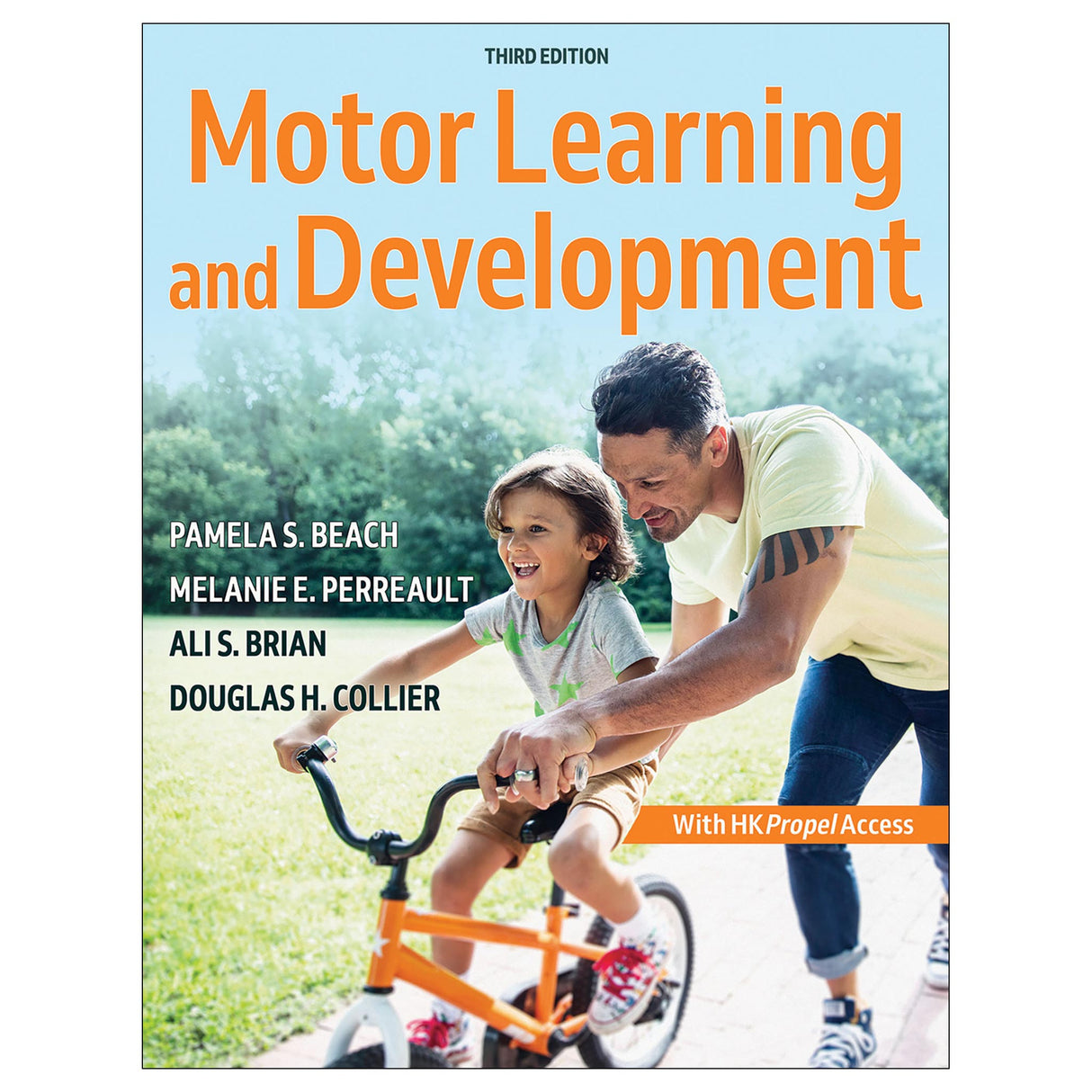Motor Learning and Development-3rd Edition With HKPropel Access
$180.95 CAD
Motor Learning and Development, Third Edition, outlines the fundamental concepts of both motor learning and motor development. It explores movement patterns across all ages throughout the human life span, including the influences of life transitions and individual and sociocultural constraints. The text provides a complete framework for students to consider the many variables for each individual and then create and implement developmentally appropriate movement programs.
The third edition has been revised and updated with current research and examples, and it includes the following enhancements:
- Expanded coverage of fundamental movement skills and skill classification
- Four new chapters exploring the assessment of gross motor development, sociocultural constraints, developmental models for instruction, and program design
- Additional videos illustrating fundamental motor skills, motor milestones, and infant reflexes
- New supplemental activities at the end of each chapter prompting students to apply concepts from the text to their own life experience
Other learning aids within the book include chapter objectives, glossary terms, sidebars, and supplemental activities to emphasize the evolution from research to practice. Opening vignettes in each chapter demonstrate the breadth of professions that use research in motor behavior.
Motor Learning and Development, Third Edition, offers a foundation for understanding how humans acquire and continue to develop their movement skills throughout the life span.
Note: A code for accessing HKPropel is included with all new print books.
Audience
Textbook for undergraduate courses that merge motor development and motor learning; reference for researchers in motor behavior, coaching education, and physical education.Chapter 1. Perspectives in Motor Behavior
Defining the Fields of Motor Behavior
Motor Control
Motor Learning
Motor Development
History of Motor Competence Research
Summary
Chapter 2. Theoretical Constructs in Motor Behavior
Information-Processing Theory
Ecological Approach
Dynamic Systems Approach
Summary
Chapter 3. Understanding Movement Control
Reaction Time
Attention
Arousal
Sensory Contributions
Memory
Summary
Chapter 4. Skill Classification
Skill Classification
Skill Versus Ability
Summary
Chapter 5. Stages of Skill Acquisition
Motor Learning Stages
Link to Dynamic Systems Approach
Practical Use of Learning Models
Summary
Chapter 6. Assessing Motor Learning
Indicators of Motor Skill Learning
Performance and Learning Tests
Games Classification for Promoting Transfer
Promoting Positive Transfer for Any Motor Skill
Summary
Life Span Physical Activity and Movement
Chapter 7. Infant Motor Development
Prenatal Development
Sensory Capabilities
Early Movements
Infants at Risk
Summary
Chapter 8. Locomotor and Stability Skills in Childhood
Fundamental Motor Skills
Locomotor Skills
Summary
Chapter 9. Object Control Skills in Childhood
Development of Object Control Skills
Summary
Chapter 10. Movement in Adulthood
Aging
Physical Activity
Self-Regulation in Physical Activity
Peak Athletic Performance
Movement Patterns
Summary
Chapter 11. Assessment of Gross Motor Development
Motor Performance Versus Development
Categories of Assessment
Summary
Individual and Environmental Constraints
Chapter 12. Physical Development
Nature and Nurture
Physical Growth and Maturation
Body System Constraints
Summary
Chapter 13. Physical Aging
Skeletal System
Muscular System
Aerobic Capacity
Cardiovascular System
Nervous System
Endocrine System
Body Composition
Sensory System
Summary
Chapter 14. Knowledge and Cognitive Constraints
Knowledge Constraints
Cognitive Constraints
Summary
Chapter 15. Psychosocial and Affective Constraints
Psychosocial Constraints
Affective Constraints
Self-Regulation
Summary
Chapter 16. Sociocultural Constraints
Gender
Race
Cultural Background
Disability
Aging
Summary
Designing Developmentally Appropriate Programs
Chapter 17. Developmental Models for Instruction
Motor Development Models
Sport Development Models
Summary
Chapter 18. Prepractice Considerations
Goal Setting
Demonstrations
Verbal Instruction
Directing Attention and Providing Guidance
Summary
Chapter 19. Practice
Variable Practice
Contextual Interference Effect
Practice Specificity
Part and Whole Practice
Distribution of Practice
Mental Practice and Imagery
Summary
Chapter 20. Feedback
Functions of Feedback
Types and Modalities of Feedback
Providing Effective Feedback
Summary
Chapter 21. Program Design
Gold Standards Versus Variability
Ecological Task Analysis
Summary
History of motor competence research
Promoting positive transfer for any motor skill
All ancillaries are free to adopting instructors through HKPropel.
Instructor guide. Includes sample answers to the What Do You Think? and Try This sidebars from the book (and also in HKPropel). It also includes troubleshooting tips for each chapter and its labs.
Test package. Contains more than 450 questions in multiple-choice, true-false, and essay formats. The files may be downloaded for integration with a learning management system or printed for use as paper-based tests. Instructors may also create their own customized quizzes or tests from the test bank questions to assign to students directly through HKPropel. Multiple-choice and true-false questions are automatically graded, and instructors can review student scores in the platform.
Presentation package. Features more than 500 PowerPoint slides of text, artwork, and tables from the book that can be used for class discussion and presentation. The slides in the presentation package can be used directly within PowerPoint or printed to make handouts for students. Instructors can easily add, modify, and rearrange the order of the slides.
Instructors also receive access to all student materials in HKPropel. For Motor Learning and Development, Third Edition, this includes laboratories for each chapter; learning activities; and over 90 videos demonstrating people of various ages, including infants, completing motor tasks.







